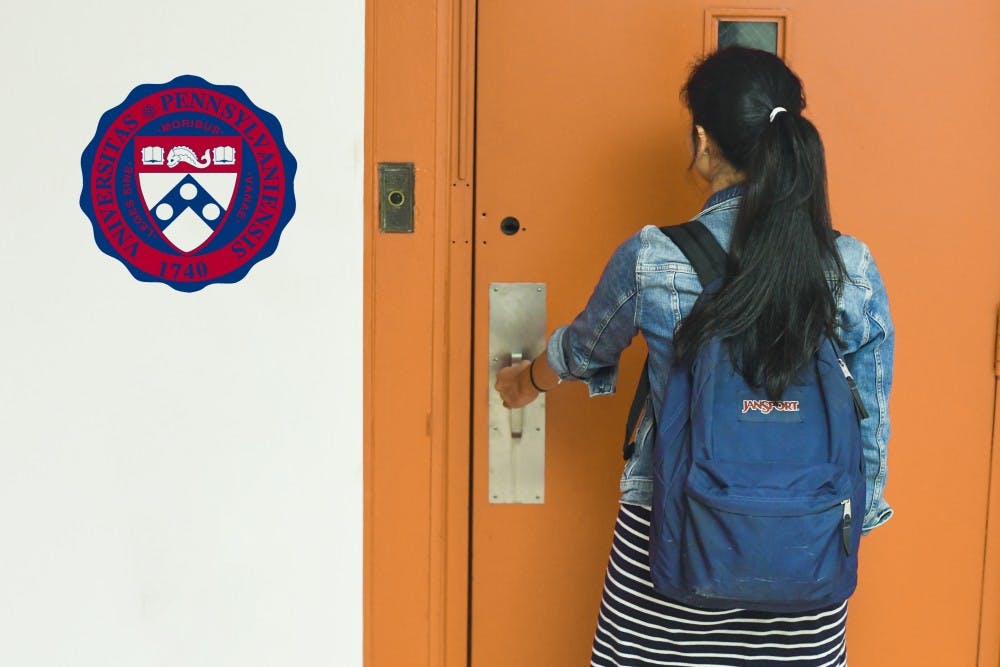Picture Penn’s campus mid-July – it’s a humid Philly summer, but you and most other students are far, far away, probably either at the beach or at an investment bank. Still, somehow I found myself right back in University City, working as an RA and TA at one of the many high school business programs on campus. Unfortunately, it became clear that many participants and their families overvalue these pre-college programs, expecting a magic shortcut to college admissions.
Summertime Locust Walk is flooded by 15-year-olds in brightly colored T-shirts and matching lanyards. Closely packed, the rainbow-branded clusters are herded around campus to experience Penn through an array of pre-college summer programs hosted at the University. It’s almost a carnival. Step right up and get your 30-day trial of the Penn undergrad experience before committing to the full subscription … that is, as long as Penn commits to you, too.
So many of these programs have popped up that they overcrowd the resources on campus also used by University students. At peak high school rush hour over the summer, the line for Hill or New College House dining halls (the only two that were open) extended long out the door. What’s more, on-campus dorms were filled to capacity, so Penn’s programs also rented space at Drexel University to accommodate the students. Just imagine if you’re a Penn undergrad staying on campus for the summer to squeeze in a class or two only to have your living spaces overtaken by teenage hordes.
Where do they all come from? Some summer programs are run directly by any of Penn’s 12 schools, while others are managed by partner companies. Through the Penn Pre-College Program at the School of Arts and Sciences, 10th and 11th graders can live on campus and enroll in a for-credit class for the price of $11,279 or more. Those with tighter budgets can select a not-for-credit option like the Summer Academies for only $8,449. Wharton alone offers seven pre-college programs ranging from sports business to finance, and the Penn Law Pre-College Academy and the Penn Engineering Summer Academy are other popular options.
With the astronomical price tag, it’s worth wondering what students and their parents expect to gain from these programs – and whether they actually get it. The first question on many eager participants’ minds is whether they will get an edge in the admissions process for doing a program at their dream school. Well, the answer is no. In fact, pre-college summer programs generally signify wealth and opportunity to admissions officers, rather than achievement. When students are asked to describe their summer experience on the Common Application – did they work as a cashier at Walmart? Volunteer at a hospital? Lounge by the pool? – admissions officers are looking for signs of personal development and personality much more than whether a fancy name is attached.
Let me speak from experience. Most of the high school students I met during the program were incredibly smart, curious, and eager to make the most of their time. Most also had some degree of anxiety over the college admissions process. I witnessed their stress and uncertainty about the future, which I was both complicit in and tried to diminish. One student told me that he couldn’t help but feel – however irrationally – that the business plan and pitch that he developed as a final project was a test of whether or not he was qualified for Wharton. And who can blame him?
In reality, these pre-college programs both feed into and are fed by the increasingly competitive college admissions culture. And Penn is not alone; Yale, Stanford, Harvard, Brown, and most other big-name schools boast similar programs encouraging students to “get a feel for what college life is like,” as Summer@Brown puts it.
Let’s be clear – these programs can still be amazing experiences for students: a chance to meet interesting people, face new academic challenges, and live in a new environment. Not to mention, some offer scholarships and financial aid to expand access. Still, the base of most pre-college programs are upper-income families, and what most of them are paying for is just not worth it. Instead, high schoolers eager to gain an edge in the admissions process would get a better deal by enrolling in a course at a community college or online, not to mention getting a job.
SEE MORE FROM JULIA MITCHELL:
International students deserve transparency from Student Financial Services
The inexhaustible demand for costly pre-college programs prove that Penn and its peer institutions are businesses with powerful brand names to be exploited. In fact, the higher tuition climbs, the more creativity and trial rounds will be required to sell it as both an investment and an experience. In that respect, pre-college programs are in danger of resembling an ad campaign or trial period for consumers, rather than a growth opportunity for adolescents.

JULIA MITCHELL is a College and Wharton freshman from Yardley, Pa. studying International Relations. Her email address is jcmitch@wharton.upenn.edu.
SEE MORE FROM JULIA MITCHELL:
International students deserve transparency from Student Financial Services









